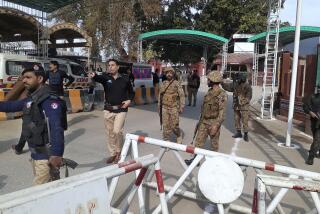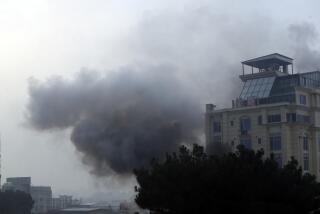Suicide bombing in Afghan bathhouse kills 17
- Share via
Reporting from Kabul, Afghanistan — A suicide bomber blew himself up Friday at a public bathhouse in southern Afghanistan that was filled with men washing themselves before the main prayers of the Muslim week. At least 17 people were killed and 23 injured, provincial officials said.
The Taliban claimed responsibility for the attack in Spin Buldak, in Kandahar province. The area, a main crossing point into Pakistan, is a longtime nexus for drugs and weapons smuggling.
A Taliban spokesman, Qari Yousef Ahmadi, claimed that the explosion had killed the deputy commander of the province’s border police force. Abdul Razak, the border police commander, said a lieutenant colonel on the force was killed but that the man was not his deputy. Two other police officers were among the injured, he said.
The attack appeared to be a direct challenge to the authority of Razak, who is the main power broker in that part of the province and has close ties with the U.S. military despite widespread accusations against him of corruption and human rights abuses. Over the last year, Razak has managed to render Spin Buldak relatively secure by bringing militias under his control into the border police.
The bombing showed, however, that the insurgents remain capable of large-scale attacks in the area despite an intense Western military campaign in Kandahar province, led by U.S. forces. The North Atlantic Treaty Organization has claimed success in driving insurgents out of traditional strongholds close to Kandahar city, the south’s main population hub and the Taliban movement’s spiritual home.
Afghan President Hamid Karzai condemned Friday’s attack, calling it un-Islamic. Denunciations also came from the U.S. Embassy and NATO’s International Security Assistance Force.
Although mosques have sometimes been targeted by suicide bombers, an assault on men doing their pre-prayer ablutions was shocking to many Afghans. Nearly all the dead and wounded were civilians.
Civilian casualties in the 9-year-old conflict hit record levels last year, jumping by 20% in the first 10 months, according to the United Nations. More than three-quarters of the noncombatant deaths are blamed on the Taliban, though deaths caused by international forces tend to draw a particularly angry reaction from the Karzai government.
Also Friday, three Western service members were killed, one in an explosion in southern Afghanistan and two in a bombing in the east, the NATO force said. Their nationalities were not disclosed, but Americans make up the preponderance of troops in both of those areas.
More to Read
Sign up for Essential California
The most important California stories and recommendations in your inbox every morning.
You may occasionally receive promotional content from the Los Angeles Times.










